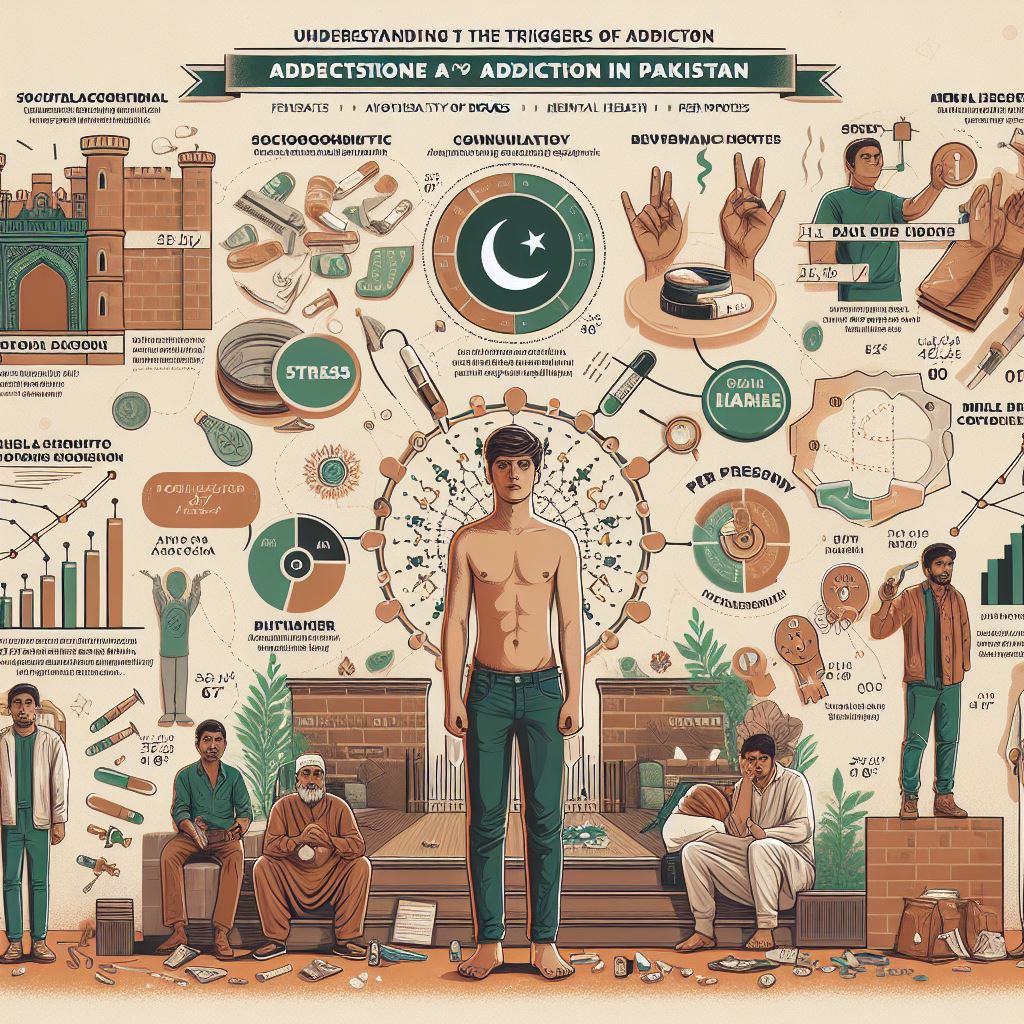Understanding the triggers of cocaine addiction in Pakistan requires a multifaceted approach, considering various socio-cultural, economic, and psychological factors at play. This comprehensive analysis will delve into the intricate dynamics influencing cocaine addiction in Pakistan, exploring its root causes, prevalence, societal impact, and potential interventions.
Introduction
Cocaine addiction, a global public health concern, is not confined to Western societies but extends its reach to regions like Pakistan, despite stringent legal measures and cultural norms against drug abuse. To comprehend the triggers of cocaine addiction in Pakistan, it is essential to examine the broader context of drug abuse in the country, historical trends, socio-economic factors, and the interplay of individual vulnerabilities.
Historical Context
Pakistan has a complex history of drug trafficking and abuse, rooted in its geographical location as a transit point for narcotics. The Afghan opium trade, fueled by decades of conflict in neighboring Afghanistan, has significantly impacted Pakistan, leading to widespread availability of illicit substances, including cocaine. Historical precedents, such as the flourishing drug trade during the Afghan-Soviet war and subsequent conflicts, have contributed to the normalization of drug trafficking and consumption in certain regions of Pakistan.

Socio-Economic Factors
The socio-economic landscape of Pakistan plays a pivotal role in shaping patterns of drug addiction, including cocaine abuse. Persistent poverty, unemployment, lack of education, and inadequate healthcare infrastructure create fertile ground for substance abuse disorders. Marginalized communities, particularly in urban slums and rural areas, are disproportionately affected due to limited access to opportunities and resources. Economic disparities fuel a sense of hopelessness and alienation, driving individuals towards substance abuse as a coping mechanism.
Cultural Norms and Stigma
Cultural norms and societal attitudes towards drug addiction contribute significantly to the challenges of addressing cocaine addiction in Pakistan. Drug abuse is often stigmatized, leading to underreporting and reluctance to seek treatment. Religious beliefs, particularly in conservative communities, may further compound the stigma associated with addiction, hindering efforts for prevention and harm reduction. The prevalence of machismo culture in certain segments of Pakistani society exacerbates the problem, as seeking help for addiction is perceived as a sign of weakness.
Psychological Factors
Individual psychological factors also play a crucial role in predisposing individuals to cocaine addiction. Co-occurring mental health disorders such as depression, anxiety, and trauma often coexist with substance abuse, creating a complex web of causality. Psychological trauma resulting from conflict, domestic violence, or displacement can contribute to maladaptive coping mechanisms, including drug abuse. Additionally, genetic predispositions and neurobiological factors influence susceptibility to addiction, further complicating the picture.
Accessibility and Availability
The availability and accessibility of cocaine in Pakistan, despite legal restrictions, pose significant challenges in combating addiction. The porous borders, weak law enforcement, and corruption facilitate the smuggling and distribution of illicit drugs, including cocaine. Moreover, the emergence of sophisticated drug trafficking networks, often linked to transnational organized crime, perpetuates the cycle of addiction by ensuring a steady supply of narcotics to the market.

Peer Influence and Social Networks
Peer influence and social networks play a pivotal role in initiating and perpetuating cocaine addiction among vulnerable populations in Pakistan. Social gatherings, particularly in urban centers, where drug use is normalized, serve as breeding grounds for addiction. Peer pressure, coupled with a desire for social acceptance and belonging, can lure individuals into experimenting with cocaine, eventually leading to dependence. Moreover, the prevalence of drug trafficking networks within certain communities further amplifies the influence of peers in sustaining addiction behaviors.
Impact on Health and Society
The widespread prevalence of cocaine addiction has profound implications for public health and societal well-being in Pakistan. Health consequences range from physical ailments such as cardiovascular complications, respiratory issues, and neurological disorders to mental health disorders including psychosis, paranoia, and depression. Moreover, the economic burden of addiction, including healthcare costs and loss of productivity, exacts a heavy toll on the already strained healthcare system and hampers socio-economic development.
Challenges in Treatment and Rehabilitation
Addressing cocaine addiction in Pakistan is fraught with numerous challenges, including limited access to evidence-based treatment and rehabilitation services. The stigma associated with addiction often deters individuals from seeking help, while the lack of trained professionals and treatment facilities further exacerbates the problem. Moreover, the absence of comprehensive harm reduction programs and inadequate legal frameworks undermine efforts to mitigate the adverse consequences of drug abuse.
Policy Implications and Interventions
Efforts to combat cocaine addiction in Pakistan necessitate a multifaceted approach encompassing policy reforms, public health interventions, and community engagement. Strengthening law enforcement measures to curb drug trafficking, enhancing border security, and improving international cooperation are essential steps in disrupting the supply chain of cocaine. Additionally, investing in education, poverty alleviation, and mental health services can address underlying socio-economic determinants of addiction.

Conclusion
Understanding the triggers of cocaine addiction in Pakistan requires a nuanced understanding of the socio-cultural, economic, and psychological factors influencing patterns of drug abuse. Addressing this complex issue demands a concerted effort involving government agencies, civil society organizations, healthcare providers, and communities. By adopting a holistic approach that addresses root causes and promotes evidence-based interventions, Pakistan can mitigate the impact of cocaine addiction and pave the way for a healthier, more resilient society.



